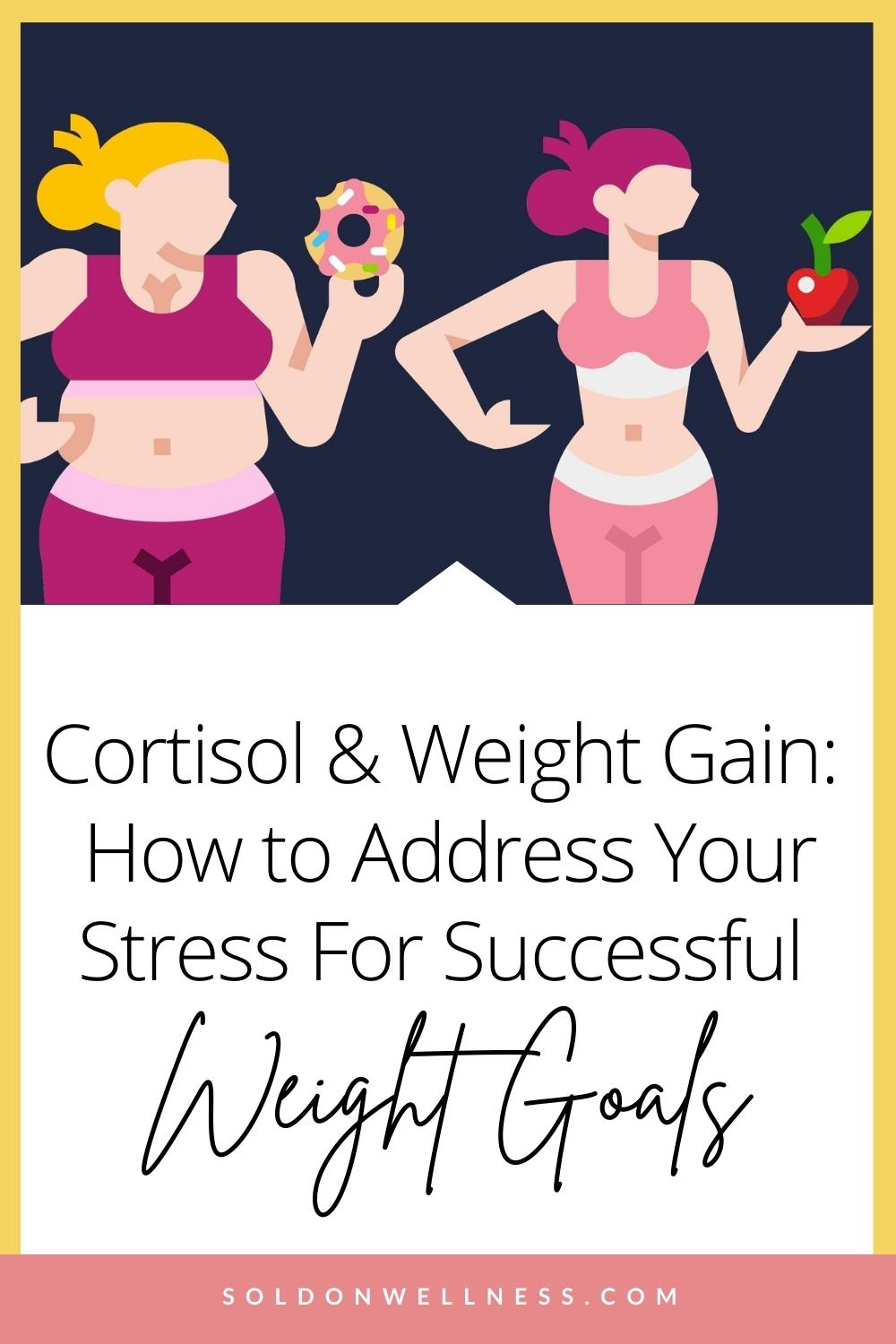Cortisol and weight gain are inextricably linked. It's a stress response, but many people don't know how the hormone can affect their waistlines and what they can do about it.
Food is fuel for your body, and when you're stressed out or worried, especially if that worry manifests as constant worrying thoughts in your head, food becomes an easy way to quell those feelings.
It's common for stressed or anxious people to turn towards food as a coping mechanism, so if you're experiencing chronic stress and feeling like life is unmanageable, then it may be time to make some changes.
This article will show you how to reduce your cortisol levels naturally and stop eating junk food when you're stressed out.
Cortisol (stress hormone) and weight gain

When you are experiencing weight gain, understanding the connection between weight gain and cortisol can be a powerful tool for managing your weight.
Cortisol is often referred to as the stress hormone because it triggers the fight-or-flight response in humans, which can signal feelings of fear and anxiety and lead to excess insulin production, especially if you have diabetes.
In people who are overweight or obese, cortisol may produce a higher level of insulin to maintain blood sugar levels.
High insulin can cause people's bodies to store more fat and put on weight, which is a vicious cycle.
In response to the continued cortisol stimulus, cells may become resistant or insensitive to insulin. This means that less glucose (sugar) will be available for use by the cells.
- Elevated stress levels can lead to weight gain.
- Stress hormones like cortisol and adrenaline are released when the body is under stress
- These hormones signal the body to store more fat in preparation for a fight-or-flight response
- Cortisol, which is produced by the adrenal gland, causes an increase in blood sugar, leading to increased appetite and cravings for comfort foods
- Adrenaline also stimulates hunger by making food taste better and increasing stomach acid production
- When people are chronically stressed, they may eat larger portions of unhealthy foods because they're not thinking about their health or dieting habits as much as someone relaxed
Where is cortisol released from?

Cortisol is released by the adrenal gland, a small organ located on top of your kidneys. Your hypothalamus and pituitary glands also release cortisol in response to stress.
The hormone is meant to help you cope with stressful situations by giving you energy and increasing blood sugar to be converted into fat for storage.
However, what happens when you're constantly stressed?
The pituitary gland and hypothalamus continue to release cortisol, even when you don't need it.
Your body tries to defend itself by increasing glucose levels in your bloodstream - causing weight gain.
Cortisol Levels and Weight Gain

Many people will try to reduce their weight by controlling the amount of food they eat or increasing their exercise, but this can be difficult.
Stress has been proven as a significant cause of weight gain, and it is also tough for many people to control because so much stress comes from things that are out of our hands.
One way you can control your stress, and the weight you are gaining is by regulating cortisol levels.
To regulate these hormones, it's important to manage your sleep cycle and reduce exposure to harmful toxins.
It helps many people get better quality sleep because they're able to minimize their amount of time in bed so that there isn't prolonged wakefulness at night.
It would help if you also tried to spend at least a little time in the sun each day for vitamin D and reduced exposure to chemicals, such as BPA or flame retardants that can be found in many plastics.
What is stress, and why does it cause weight gain

Stress is an emotion, and it is also a physical response to any event.
When people experience stress, they may have increased heart rate or blood pressure; they might feel tense muscles in their neck or back and more.
Stress can actually cause weight gain because of the physical responses during high stress, like when someone's body releases cortisol (one type of hormone).
People under a lot of stress typically have more difficulty maintaining their weight and may find that they gain or lose pounds during stressful times.
Research has found that cortisol levels go up when people experience high-stress events like embanking on a huge project or public speaking events.
And the longer someone is experiencing high levels of stress, the longer the cortisol levels in their body will be elevated.
When people are under a lot of stress, they may experience appetite changes or cravings for unhealthy foods that can lead to weight gain and other health problems like diabetes or high blood pressure.
People with high-stress levels may also find it difficult to sleep and maintain a good diet, leading to weight gain.
So what is the connection between cortisol and weight?

It's not just that some of us eat more when we are stressed, although overeating is a problem for many people who experience chronic or acute anxiety.
The real culprit is our pesky hormone called cortisol which we’ve discussed above.
I’ll like us to look at the effect of cortisol on weight gain, stomach, protein metabolism and carbohydrate.
Cortisol and weight gain stomach
Cortisol and weight gain stomach is a complicated connection.
Too much cortisol leads to weight gain stomach because it increases our appetite and slows down the metabolism of protein catabolism, leading to insulin resistance.
Cortisol affects carbohydrates not exclusively, but one important way is through its effect on blood sugar levels.
Effect of cortisol on protein metabolism
The effect of cortisol on protein metabolism is another major player in the equation.
Too much cortisol slows down protein metabolism, leading to reduced muscle mass and increased fat storage.
Effect of cortisol on carbohydrate
The effect of cortisol on carbohydrates is not exclusively but one important way to manifest itself through its effect on blood sugar levels.
The release of this hormone causes a spike in blood sugar.
Effect of cortisol on blood sugar levels
The effect of cortisol on blood sugar levels is significant and affects the ability to metabolize carbohydrates, leading to insulin resistance.
This protein hormone also lowers HDL cholesterol (the good kind) and raises LDL cholesterol (bad).
These effects are important early warning signs that should be investigated more closely.
Effect of cortisol on sleep
The effect of cortisol on sleep is also important and can lead to chronic insomnia.
Cortisol not only increases wakefulness but suppresses REM (rapid eye movement) sleep, which in turn leads to less deep or restful sleep.
This last point about the lack of efficient or adequate sleep results from the stress hormone cortisol.
How to identify when you're stressed out

1. Stress causes your body to release cortisol, a hormone that increases appetite and sugar cravings
2. Stress can cause you to feel tired, which means less activity and more time spent on the couch eating
3. Stress makes it difficult for your brain to make good food choices because it's too busy trying to figure out what is going on
4. When you're stressed, your blood pressure rises, which can lead to weight gain if not controlled
5. When you're feeling down about yourself, stress will only make things worse - don't beat yourself up over every little thing!
6. Stress can also cause insomnia and appetite changes.
Ways to reduce stress in your life

You can reduce the stress in your life by changing your mindset and learning to manage it. If you don't know-how, these five tips will help:
- Figure out what's stressing you and why
- Take deep breaths when you feel stressed or anxious
- Take deep breaths when you are feeling overwhelmed by life's stresses; this helps calm the nervous system and bring oxygenated blood flow throughout the body
- Listen to music with relaxing beats; there are many types of music designed specifically for relaxation purposes, such as ambient/chillout music or classical music
- Practice mindful meditation where one focuses solely on breathing without any other distractions such as thoughts or worries; this trains the mind so that it can be present at the moment
- Do something relaxing stretch exercises at night before bed, such as Pilates.
- Dress comfortably in clothes that allow you to breathe and do not restrict your movement; for instance, avoid wearing tight-fitting clothing like jeans or leggings if they are constricting.
- Remove the clutter from your surroundings: throw away old possessions that no longer serve you.
- Eat healthy foods low on the glycemic index, such as vegetables, fruits, beans and legumes. This will help you maintain a stable blood sugar level that prevents cravings and mood swings.
- Laugh as often as possible: watch funny videos, read jokes or have fun with friends.
- Improve your sleep hygiene: stop using electronics at least two hours before bed; try to get enough rest, such as seven-eight hours of continuous sleep each.
- Ask for support from friends and family that can offer a different perspective on the situation that is causing the stress.
What's Next?

What you can do today to help fight the battle against stress-related weight gain...
1. Take care of your mental & physical health:
The benefits of taking care of your mental health now (even if you're not overweight) will help to make sure that the weight gain caused by stress doesn't happen in the first place.
Take care of your physical health:
Exercise regularly and follow a nutritious diet, as these will also help you feel good about yourself.
Try to get enough sleep, too, so that your body has time to recover from what it's been through each day.
2. Create a productive morning routine
You can create a morning routine that will work for you.
One way to do this is by leaving time in your mornings for the things that are important to you and being productive and feeling like it's been a successful morning when it ends.
- Get up early enough to have time for your morning routine
- Take some time in the morning to plan out what you're going to do during the day, or write a list of things that need to be done. This will help you stay on track throughout the rest of the day.
- Make sure there are healthy snacks at home and that you have a healthy breakfast to start the day.
- Get some exercise in the morning to help you feel energized and prepared for your day! Walk, do yoga or weights, go for a run - find what works best for you.
- Set yourself up with an alarm that refreshes every hour on your computer so it's easy to stay on track throughout the day (this is a great way to stay on track with your priorities and not get distracted).
- It will help if you weigh yourself once per week, up in the morning before eating or drinking anything. Be aware of trends over time, so you know if there's an issue that needs attention. If you're losing weight, you should be ‘looking’ taller, and your clothes should fit better.
- If you're gaining weight, it's time to assess what needs a change for the trend to reverse course.

- Don't make any changes without first taking into account other factors that might affect your weight like medication side effects or interactions, thyroid function, hormone levels, and other medical conditions
- Find ways to incorporate physical activity into your life - exercise more than you eat! Take the stairs instead of the elevator.
- If possible, spend some time in nature during your morning routine. Take this time as an opportunity - even if it's just 15 minutes of walking outside or observing what is around you.
6 foods that you can't eat if you're trying to lose weight

If you are trying to lose weight, there are certain foods you should not eat.
- Sugars: sugary drinks, candy bars
- Fats: fried foods, fast food restaurants
- Alcohol: Alcohol is high in calories and can slow down weight loss efforts
- Processed Foods: Processed foods are often high in sugar and fat, making them difficult to digest.
- Artificial Sweeteners: processed foods are often high in sugar and fat, making them difficult to digest.
- Refined Grains: refined grains, such as white bread or pasta, contain little nutrients but a lot of calories
6 Ways to Make Your Workout More Enjoyable

I know that so many women give up halfway into their exercise regime. I can relate! However, you can actually make workouts more enjoyable by trying these tips:
- Make a playlist with your favourite songs
- Go to the gym with a friend or family member for social support and laughs - Find workout clothes that make you feel comfortable in what you're wearing.
- Schedule your workouts at times when you are most likely to be well-rested so as not to let yourself down. If possible try to exercise at the same time every day.
- Take a moment to stretch before starting your workout! This will help you get more out of your exercises and can prevent injuries from happening as well.
- Listen to an audiobook or podcast while working out for some distraction and even learning opportunities.
Connection with God - the psychospiritual stress management

When we feel an imbalance in our lives, and the stress we face seems so great that we feel helpless, it is important to reconnect with our higher power.
Heavenly Father has blessed us with the opportunity for self-mastery, and he wants us to turn back to him in times of need.
There are several ways to do this: prayer, scripture study, doing service work or other acts that bring a feeling of peace.
MORE TOPICS FOR YOU:
13 Symptoms of High Cortisol Levels: What to Know
Anxiety and Stress Symptoms: Important Awareness for Female Entrepreneurs
Conclusion

Weight management is a combination of many factors.
What you eat, how much you exercise, and even your emotional health affects your look.
And while all these other aspects are important to consider when looking for a weight management plan, it is also important to understand the impact stress has on our bodies and why this ultimately leads to weight gain.
It is important to limit one’s exposure to stress because many negative effects can come from this event or condition.
Some people may try and deal with these events on their own, but in most cases seeking professional help should be the best course of action.
There are many therapists who can help you through your stressful situation and teach you coping mechanisms to keep stress at bay in the future.
The sooner someone gets professional treatment, the better their chances for a healthy weight management plan will be.
Hope you found this article helpful! If you have any questions or contributions, feel free to leave them in the comments.
MORE RESOURCES:
- https://www.corporatewellnessmagazine.com/article/does-stress-hormone-cortisol
- https://www.verywellmind.com/how-stress-can-cause-weight-gain-3145088
- https://blog.bonsecours.com/healthy/weight-gain-stress-cortisol-l








